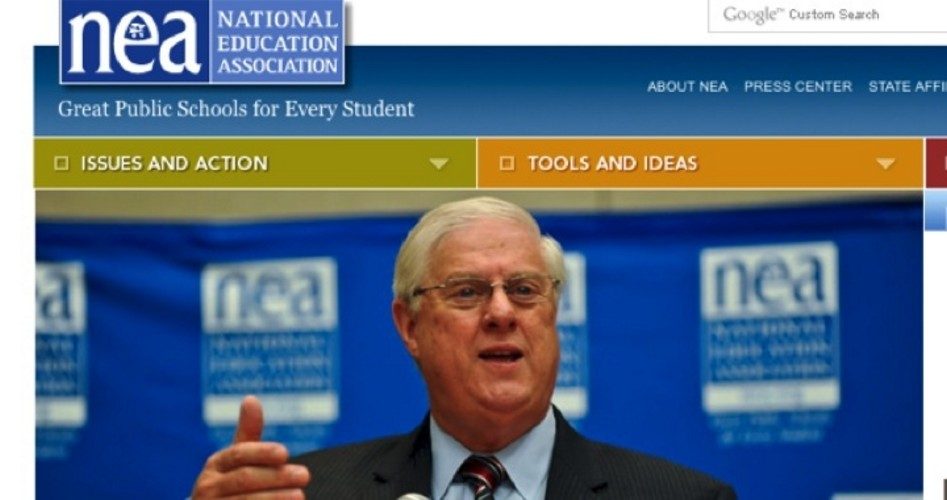
The National Education Association, the nation’s largest teachers union and ardent supporter of the Common Core academic standards, has now called the nationwide implementation of the standards “completely botched.” What is needed is a major “course correction” that may require a revision of some of the standards, along with teacher input into implementation of the standards and accompanying tests, NEA president Dennis Van Roekel (shown) wrote in a letter sent Wednesday to the union’s more than three million members, Politico reported.
The often controversial standards have been adopted by 45 states and the District of Columbia. New lessons and the exams introduced in the classrooms this year have sparked widespread protests, and at least one state, Indiana, is reported to be on the verge of pulling out of the program. Several other states are expected to have heated debates this spring over the standards, including Michigan, Wisconsin, and Georgia, Politco said. In his letter to the members, also published on the NEA website, Van Roekel charged that in some states the manner in which the Common Core State Standards have been put in place has amounted to “malpractice.” He noted that the “completely botched” verdict would come as no surprise to the teachers.
Seven of ten teachers believe that implementation of the standards is going poorly in their schools…. Worse yet, teachers report that there has been little to no attempt to allow educators to share what’s needed to get CCSS implementation right. In fact, two thirds of all teachers report that they have not even been asked how to implement these new standards in their classrooms.
Imagine that: The very people expected to deliver universal access to high quality standards with high quality instruction have not had the opportunity to share their expertise and advice about how to make CCSS implementation work for all students, educators, and parents.
Consequently, NEA members have a right to feel frustrated, upset, and angry about the poor commitment to implementing the standards correctly.
Writing in the NEA Today, Tim Walker has chronicled some of the areas of major discontent over implementation of the standards, starting with the state of New York, where the 600,000-member New York State United Teachers voted to withdraw its support for Common Core as implemented. “State officials have been put on notice: Implementation must be done with us, not to us,” Walker wrote. “Without a strong educator voice in the process, the Common Core State Standards cannot succeed.”
In Connecticut, Governor Dannel P. Malloy and legislative leaders have called for the formation of an advisory group, consisting of members of education organizations and union leaders, to review one cause of NEA concern, the Common Core assessment program that links evaluation of teachers’ performance with students’ test scores. In Missouri, the State Board of Education in January approved a new state assessment plan, supported by the Missouri NEA, that increases classroom instructional time by reducing the time students spend taking state tests. A bill in the Maryland General Assembly, supported by the Maryland State Education Association, would establish a workgroup to address what MSEA President Betty Weller has called the “tsunami of education reform” included in the Common Core standards. MSEA is also pressing for passage of a measure that would require the state to seek a waiver from the U.S. Department of Education to cancel the Maryland School Assessment (MSA), a test taken by students in grades 3-8, because the test is not aligned to the new Common Core standards.
“Old tests are being given, but new and different standards are being taught,” Van Roekel wrote. “And, then, to make matters worse, many states are proceeding to use these invalid test results as the basis for accountability decisions. This is not ‘accountability’ — it’s malpractice.”
Development of the Common Core standards began in 2009 when the National Governors Association convened a group of educators to devise guidelines for an educational program that will enable students to better compete in the global economy. As announced on June 1, 2009, the goal is to develop K-12 education standards that are “robust and relevant to the real world, reflecting the knowledge and skills that our young people need for success in college and careers.” Standards for Mathematics and English Language Arts were issued in 2010. States that adopted the standards would be eligible to compete for Obama administration “Race to the Top” grants. Texas, Virginia, Alaska, and Nebraska are the only states that have not adopted any of the standards, while Minnesota has adopted the standards for English Language Arts, but not those for Mathematics.
While teachers and their union officials have objected to the way the standards have been implemented, others see problems in the standards themselves. Some critics have found the math standards set too low, while others have focused their objections on the reading program for English Language Arts, particularly on the new emphasis on strictly “informational reading” and a corresponding reduction of traditional literary texts. In schools following the standards, students will see less of Shakespeare and Melville and more of texts such as “Recommended Levels of Insulation” by the U.S. Environmental Protection Agency and the U.S. Department of Energy, and “Executive Order 13423: Strengthening Federal Environmental, Energy, and Transportation Management.”
Charges have also been leveled at the suggested history readings, including allegations of factual error and liberal bias in the texts. Nor is the controversy limited to those involved in the public school system. As reported at thenewamerican.com, a coalition of more than 130 prominent Catholic scholars has called upon the U.S. Catholic bishops to oppose adoption of Common Core by the nation’s Catholic schools, where more than half of the dioceses in the United States have adopted the new secular standards.
“NEA has been called upon to oppose the standards,” Van Roekel noted in his letter to the members. “It would be simpler just to listen to the detractors from the left and the right who oppose the standards. But scuttling these standards will simply return us to the failed days of No Child Left Behind (NCLB), where rote memorization and bubble tests drove teaching and learning. NEA members don’t want to go backward; we know that won’t help students. Instead, we want states to make a strong course correction and move forward.” (Emphasis in the original.)
Another possibility, though unlikely to fit the NEA agenda, would be to scuttle the Common Core standards and the “Race to the Top” grants, while petitioning Congress for repeal of the No Child Left Behind Act and abolition of the federal Department of Education. That would leave individual states and local school boards to fashion their own academic standards, an approach the Constitution requires and American education tradition has vindicated. It may strike the professional educators as a paradox, but perhaps the best “move forward” would be a return to the success with which academic subjects had been taught in U.S. schools for generations, long before the experts began devising a “tsunami of education reforms.”


